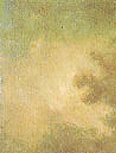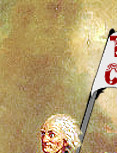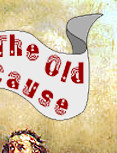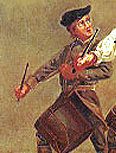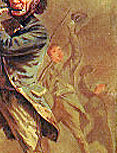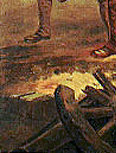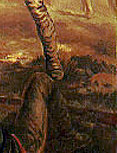All
that said, let us have a look at our times in a Saxon
sightframe. Thus: 'On thisum geare feng Willelmus
Clinton to rice & ricsode viii wintra. He saede
thaet he ne marihwana naefre inhalode and thaet he
ne secs haefde naefre mid thaem wifmanne, Lewinsky
hâtenum.' Lucky for us, the Anglo-Saxon
Chronicle isn't still in business. Weighed even-handedly,
though, I wene that the Chronicle was in its
way nine or ten times more truthful than the New Tidings
of York, that great newsblade and papyrus of lasting
wisdom. (Paper of record doesn't cut it as
sham-Old English.)
But
let us leap ahead to Middle English. 'Whan that
Clinton, with his bitten lippë, the folkes pain
hath got in grippë, and telleth allë who
him ear lendeth, some truth and lies which he well
blendeth, then goën folk on pilgrimages, fleën
Dodge, and smoke' blancmanges......' Well, maybe
not. We can't all be J.R.R. Tolkien and live the eld
in the new. Woe is us. Anygate, the baleful saga of
the something-and-thirtieth firstman of the In-Gathered
American States doesn't at all come up to the standards
and hallmarks of epic poetry or even juke joint jumpin'
folklore of the kind that Billy C. Riley and the Little
Green Men could have brought forth in the here-and-now,
were they not locked into the there-and-then. Our
Billy C. is, unluckily, very much with us and so is
his aspiring successor – 'waes se grimma gast,
Algor haten.' That gifted fee-seeker – collector
of the port of London – Geoffrey Chaucer might have
understood them. And it's no hard work putting Billy
C. in a couple of Chaucer's tales. If only this administration
had an evil reeve, a canting bishop, or at least a
corrupt monk…. And some swiving…. A whole wainload
of swiving.....
UNE
AUTRE REMINISCENCE INDO-EUROPEENNE
Long-time
readers will recall that in my third column I dealt
with Indo-European myth and 'ideology' as reconstructed
by the school of Georges Dumézil. Indo-Europeanists
have uncovered a body of doctrine about a three-caste
society made up of 1) priests, 2) warriors, and 3)
economic producers. This inherited world-outlook continued,
even after its disappearance as religion, profoundly
to influence subsequent European thought. It is no
accident that Hegel and Marx both insist on three
stages of history, nor is it accidental for a North
American republic to divide its governmental structure
along just these lines, with a Supreme Court (first
function), an Executive Branch (second function),
and a Congress representing the interests of the economic
producers and handing out pork – the classically
Celtic foodstuff – to those favored by the state.
The Second Amendment sought to protect the second-function
right to keep and bear arms; the strictly republican
innovation was to let members of the Third Estate
take part in defense.
TRAGICOMIC
ACTION HENCE BORNE OUT TO WASTE THE MEMORY OF THE
FORMER DAYS
This
brings me to that [entirely fictitious] epic poem,
The Clintoniad. Setting the characters and
action, comic or otherwise, of the Clintoniad
in an Indo-European mythical framework should yield
new insights into the meaning/meaninglessness of the
story's central figure, the Emperor Prezboy.
Prezboy's
misdeeds take place in a prosperous imperialist democracy
set in Winland (North America) in a period of Late
Hellenistic Despair. However well republican forms
have been kept up, the state has become a World Empire
which rules mankind as the Last Remaining Super-Power
since it 'overthrew the Persians.' The career of Athens
from city-state to empire was clearly in the mind
of the unknown poet when he (or she) composed the
work. The drama increases when sinister forces pressure
Prezboy to cane the Mespotamian wogs from time to
time with missiles and Greek fire in the name of World
Justice but really on the premise that 'he who does
not submit to the Empire is a rebel against God or
maybe Mr. Charles Darwin.' Pursued relentlessly by
his enemies, the hellbent Kinstar and Henricus Dermaticus,
Prezboy commits a series of comic acts, which, once
found out, spell his possible doom and downfall.
BURIED
INDO-EUROPEAN ARCHETYPES?
I
will not summarize the deeds which bring Prezboy to
the edge of an unseating. The central problem is whether
those actions draw upon and embody some deeply hidden
mythical structure. A number of answers have been
proposed.
Some
writers have seen in Prezboy a sort of North American
Indian (Native American) 'trickster' figure modeled
on Coyote or possibly the Road Runner. Critics of
this interpretation bewail its seeming polical correctness
and, more to the point, argue that the character's
main epithet, 'slick,' repeated throughout the work,
is there for metrical reasons and adds no real meaning.
In this they are partly right and partly wrong. He
is clearly a trickster figure, but one who has been
put into the wrong mythical tradition.
HANDEDNESS,
UNDEEDS, AND UNWIT
A
possible connection is with the Norse trickster figure,
Loki, who lost his right arm subduing the giant Fenriss
wolf by treachery. In IE tradition, the 'left-handed'
figure who loses his right hand or arm does so to
bamboozle a public enemy while preparing an attack
on that enemy. These myths belong to the second function,
while the Prezboy figure is reknowned for his antipathy
to the warriors except insofar as they provide useful
public spectacles to distract the public from his
own activities. Anyway, Prezboy's left-wingness trumps
any lefthandedness, factual or mythical. The Latin
word for left-handed was sinister.
In
the euhemerized Roman telling of this IE myth, Mucius
Scaevola ('left-handed') burns his right hand off
in a fire to show his commitment to a false agreement
with a public enemy. The contrast with Prezboy seems
stark indeed. But mythic structures are subject to
far-reaching transpositions of detail, as Dumézil
showed.
Confusion
of the three 'functions' is common in later recapitulations
of IE myth, particularly where the actual castes have
undergone historical remodeling. Thus, at Rome the
producers were drawn into the second function by the
leadership of the original warrior elite, especially
as the Republic expanded and became a Universal Empire.
They still had their economic duties as well, and
under this double burden migrated to Rome itself to
become motor voters.
POST-CIVILIZED,
LOW-RENT 'RENT-SEEKERS'
It
is not surprising that similar confusion of mythical
structures took place once Winland became an Empire.
For Prezboy – portrayed as a pork-handling provincial
politico of Celtic extraction – to aspire to
the Imperial Office despite his third function origins
reflects the changing nature of imperial society and
suggests the ultimate source of the mythico-thematic
confusions on which his story is built. Thus Prezboy
represents the dream of total, irresponsible Power,
and the confusions are those of a postrepublican society
only dimly aware of its origins and its own decaying
mythical/social structures. Still, old themes make
themselves heard, however dimly, just as they do in
the Niksoniad [also entirely fictitious], which
centers on the comic action of second function (?)
burglars and, from the third function, newspapermen,
a psychiatrist, and a scholar/soothsayer, who is subsidized
by an oil billionaire and somehow entrusted with foreign
affairs, a second function task.
IE
themes, however mangled and torn ('disembedded') from
their original mythic structures, are present in the
Clintoniad, but mostly as echo. Subjected to Seinfeldian
analysis, the Prezboy story is one of self-seeking
and thrill-seeking – yes, and 'rent-seeking' – in
'an administration about nothing.' Late imperial nihilism
and decay are the real themes; but remnants of IE
myth at least decorate this sordid tale of 'wrack
and wroll' – a phrase repeatedly used by
Prezboy, especially when bombing foreigners.1
IE
literature is not without comment on such matters.
The Hindu prophecy of Kali Yuga is quite to the point:
'Goin' to hell in a handcart, innit, Shiva?' To this
sort of talk, the great supremo's main response is
constant blather about 'diversity.' Even this is subject
to comic inversion, as it appears that his real goal
is 'having a good time in diverse cities.'
Or maybe he refers to urban planning initiatives.
The point is bestritten, as the scholars say.
Note
